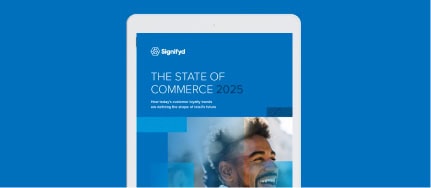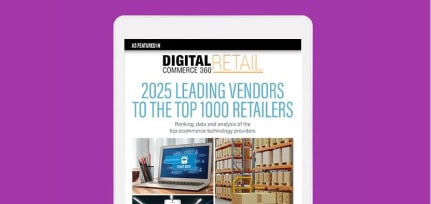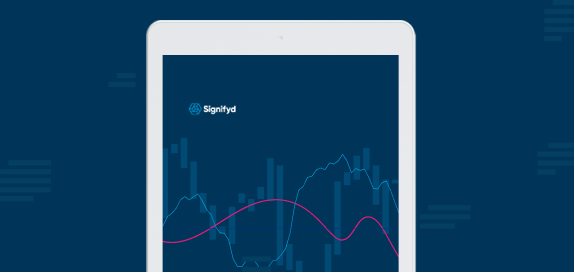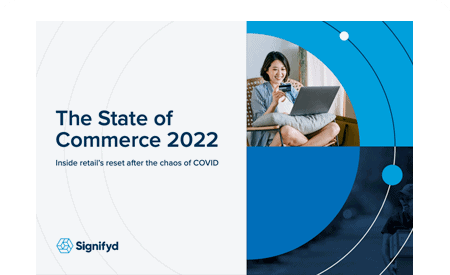Moving from a large company to Signifyd can induce culture shock – in a good way.
“There is a sense of focus that is exciting and fast-paced, which is not often found at larger companies that are later in stage,” said Nathan Ackerman, senior vice president of engineering, who spent over 10 years at large tech companies before joining Signifyd.
But that fast pace still leaves room for work/life balance, and for employees to clearly see the impact their work has. Ackerman and other employees who have made the move from much larger companies to Signifyd, with its 480-plus employees, say they appreciate how Signifyd’s smaller size has helped produce this vibrant yet supportive culture.
A fast-paced atmosphere
“The pace at which decisions are made and things move forward is faster here than at a bigger company,” said Doug Agurkis, senior manager of chargeback operations, who previously worked at Microsoft and Amazon. “There aren’t as many layers that you have to go through.”

Doug Agurkis
The quicker decisions are in part a result of a smaller, flatter organization. But they also result from a conscious effort to be more deliberate about what initiatives Signifyd teams take on and a group effort to spend time on the most meaningful work. The thinking was supercharged by Signifyd’s decision early this year to adopt a four-day workweek, which has led to an intensified focus on the top priorities.
“You want to produce, but there’s not that unhealthy fire behind it,” said Gwen Sparks, global head of business development, who joined Signifyd in June from Tableau, which is owned by Salesforce.
Employees have noticed that the idea of a meeting for the sake of a meeting is a thing of the past. Signifyd team members are more deliberate about how they spend their work time and no longer turn to gathering a group together as the first form of communication.
At previous jobs with larger companies, “I would get on every call and ask, ‘How are you?’ and the response was, ‘I’m so busy, back-to-back meetings, putting out fires, I haven’t eaten in three days,’” Sparks said. “At Signifyd, when I pick up the phone and say, ‘How are you?’ people are like, ‘Pretty good, how are you?’ Then they pull up notes, because they have enough time in their day to understand why I’m meeting with them and prepare for it.”
A balanced life
Signifyd’s four-day workweek allows its employees time to tend to other parts of their lives — leading to less burnout and better results, employees said. Combined with a policy facilitating remote work, the contrast with many larger companies is striking.
“Signifyd’s progressive, and refreshing, stance on remote work and a four-day workweek are different from what one will find at a large company, where typical five-day, in-office workweeks are becoming more common again,” Ackerman said.

Nathan Ackerman
Being a company that is able to rapidly innovate on many levels, is certainly a draw for those who have flourished at larger companies, but are looking for a role with a bigger impact. And yes, progressive people policies, including a four-day workweek, are attractive as well.
“From an employee perspective, there is a lot to recommend about a smaller, fast-growing company like Signifyd,” said Emily Mikailli, the company’s senior vice president of people operations. “As an organization, we are able to move quickly to implement policies, programs and strategies that are right for the times — such as our four-day workweek. As individuals, we’re able to creatively identify substantive initiatives that we can bring back to our teams and launch right away. We can make a difference in a very direct and immediate way and that’s a win for everyone.”
Agurkis sees his win in not having a calendar that is completely booked with meetings.
“There’s more time to focus on executing and delivering,” he said.
Making a contribution
Agurkis, like others who have made the move from a much larger company, felt like “just a number” in some previous jobs. “At a smaller company, my impact would be felt more,” Agurkis said.

Gwen Sparks
Sparks said that at Signifyd, “I get to put my stamp on building something.”
And when someone puts a stamp on something, it’s a part of the company culture to recognize the contribution — across all teams.
“Signifyd makes a huge effort to recognize folks that are not in sales – solutions engineers, customer support, and sales ops,” Sparks said. “That really creates more of a community feel and an appreciation for what everybody does here.”
She has enjoyed being able to participate in Signifyd’s maturation – for example, identifying internal processes and systems that need to be tightened up as the company grows.
“I was pleasantly surprised by how much tech stack we had for the size of the company,” Sparks said. “Most companies this size do a lot of manual stuff. Signifyd has really invested in systems to make their employees more successful.”
Signifyd has the expertise to rise to the top
Agurkis was also happy to see how much internal expertise Signifyd had already developed — he is not asked to help out with sales calls, for example, because the sales team has people with the necessary knowledge.
“It felt way more established than what I anticipated,” Agurkis said.
Still, Signifyd isn’t large enough to have highly specialized employees in every area.
“Some people really like being more of a specialist – someone comes with a question, and I know the answer to that because that’s the field I specialize in,” said Nisha Ramachandran, Signifyd’s general counsel, who previously worked at Fitbit and then at Google. “If you go to someplace smaller, there needs to be a little bit of self-awareness: You’re not going to be the specialist anymore. Do you like that feeling of not necessarily being able to answer a question decisively? Are you comfortable saying, ‘I don’t know the answer, but I can figure it out’?”

Nisha Ramachandran
Signifyd is, in fact, ideally positioned between very large companies, with armies of super-specialized employees, and very small ones, which lack expertise in many areas.
“We’re not so small that it’s just you by yourself. We are building that next set of specialists that we need here,” Ramachandran said. “So in some ways, if you’re going to make the leap from large to smaller, we’re a nice happy medium.”
A positive culture
Signifyd is small enough that Sparks has had two meetings with the CEO — and in an indication of the company culture, she said, he was on time to both those meetings.
“Everyone I meet with is on time – it’s a sign of respect for other people,” Sparks said. That’s not the only reason she feels valued and respected. “People are paying attention, not multitasking. People are genuinely asking me business-related questions. I’m constantly being brought in in a collaborative way to give input.”
Sparks said Signifyd attracts people who are motivated and conscientious. “I’m the person that’s at the door with my shoes on when it’s time to go,” she said. “It’s really nice to be in a work environment where I’m surrounded by everybody else that’s also ready to take action, not dragging their feet and holding everybody up.”
Right time, right place
Ramachandran said she likes helping companies grow from medium size to large.
“I enjoy the process of building it out to a bigger company. But I like the fact that I have come from bigger companies so I can peer around the corner,” Ramachandran said, thinking of what the company needs to build and also about pitfalls to avoid.
“It’s nice to have the perspective of somewhere big and apply that knowledge to somewhere that’s looking to that next phase of growth,” Ramachandran said. “I was looking for a company that’s at an inflection point. It’s trying to think about, how do we grow, how do we scale, how do we build for the next decade. It’s a nice moment in our history.”
Another trade-off employees sometimes have to make is between making an impact at a company and working for a company that makes an impact on its industry.
“Signifyd is a great size where both are possible,” Ackerman said. “In larger companies, it’s possible to have industry reach, but many people are usually involved, limiting direct impact in the effort. In smaller companies, every individual is crucial to its efforts, but those efforts may be overlooked or be too small to be felt by the larger industry.”
Signifyd, Ackerman said, “is small enough for individuals to have meaningful company-wide impact and large enough for that company-wide impact to get industry-wide attention.”
In other words, in ways big and small, Signifyd is in the sweet spot.
Looking for the right size to make a big impact? Let’s talk.








